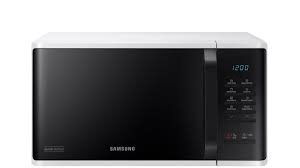Microwaves have become indispensable kitchen appliances, streamlining cooking and reheating food efficiently. However, when your Samsung microwave fails to heat, it can disrupt your daily routine and meal planning. At TheKitchenApplianceDad.com, we understand how crucial it is to get your appliance back up and running. In this comprehensive guide, I’ll walk you through common issues that might cause your Samsung microwave to stop heating and provide you with practical solutions to fix them.
Before diving into troubleshooting, it’s important to understand how microwaves heat food. Microwaves use electromagnetic radiation to excite the water molecules in food, which generates heat through friction as the molecules vibrate. This process is facilitated by several key components in your microwave:
A defective magnetron is the most common cause of a microwave not heating. The magnetron uses high voltage to produce microwave frequency to cook food. If it is burnt out or damaged, it ceases to heat food. Unfortunately, if your magnetron is faulty, it will require replacement by a professional technician.
The high voltage diode works with the magnetron and the capacitor to heat the microwave. If the diode burns out, the microwave won’t heat correctly. Testing the diode with a multimeter that measures high voltage can help determine if this is the issue.
The door switch signals other components to begin operating once the door is firmly closed. If the switch is malfunctioning, the microwave won’t start, and thus, won’t heat. Testing the continuity of the door switch with a multimeter can verify if this is the problem.
The capacitor in your Samsung microwave could also be the reason behind its failure to heat. If the capacitor has a fault, it might not release the stored electrical energy to the magnetron, necessary for heating. This component should be inspected and possibly replaced by a professional.
The thermal fuse will cut off power to the microwave if it overheats. If this fuse is blown, the microwave will not heat. Check if the fuse is in working order with a continuity test.
Sometimes, the issue might be with the microwave’s main control board. However, this is not as common. The control board sends voltage to the magnetron and other components. If it’s defective, it could disrupt the heating function. This component is best checked and replaced by a professional.
Step 1: Ensure Safety First
Always unplug your microwave before attempting any diagnostics or repairs to avoid the risk of electric shock.
Step 2: Inspect the Door Switch
Check the door switch for any signs of damage or wear. Use a multimeter to check for continuity. Replace if defective.
Step 3: Test the Diode
Using a multimeter, check the diode. Replace if it does not show continuity or shows signs of burning.
Step 4: Examine the Magnetron
Look for signs of burning or obvious damage. Since handling a magnetron involves risk due to high voltage, consider hiring a professional for replacement.
Step 5: Check the Capacitor and Thermal Fuse
Inspect these components for any signs of damage. Use a multimeter to test for continuity. Replace if necessary.
Step 6: Consult a Professional
If you’re unsure about any steps or diagnostics, it’s wise to consult a professional technician. Handling microwave repairs, especially those involving high voltage components, can be dangerous.
Check if your microwave is still under warranty. Samsung offers a warranty that might cover some of the parts and labor costs for repairs. You can contact Samsung support or visit their official website for assistance and to verify warranty coverage.
In summary, ifyour Samsung microwave is not heating, it’s likely due to issues with the magnetron, diode, door switch, capacitor, thermal fuse, or control board. By following the troubleshooting steps outlined above, you can identify and resolve the issue. Remember, safety is paramount, and when in doubt, always opt for professional assistance to ensure your microwave is repaired safely and effectively.

